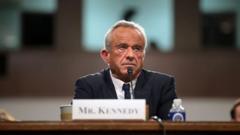Robert F. Kennedy Jr., nominated by President Donald Trump as the US health secretary, faced a contentious confirmation hearing on Wednesday where senators scrutinized his past comments on vaccines, abortion rights, and food safety. With a spotlight on his controversial views, the hearing oscillated between volatile criticism and unexpected support from some Republican senators.
RFK Jr. Faces Tough Questions and Support at First Confirmation Hearing

RFK Jr. Faces Tough Questions and Support at First Confirmation Hearing
Robert F. Kennedy Jr. navigates challenges at his confirmation hearing as questions arise about his prior vaccine comments, views on abortion, and health policies.
Throughout the hearing, Kennedy was questioned about his history of skepticism regarding vaccines, particularly regarding discredited claims linking them to autism through his tenure as head of Children's Health Defense. He reiterated that he does not oppose vaccines but emphasized the need for thorough safety studies instead. Kennedy stated, “I’m not anti-vaccine,” while also acknowledging previous statements about vaccine safety, stressing they had been misinterpreted.
A significant portion of the hearing involved Kennedy's extensive critiques of the American food industry, as he denounced the role of processed foods in health crises such as obesity. He proposed a careful review of chemical additives and pledged to eliminate financial conflicts of interest between government agencies and the food industry. In response to questions about processed foods, he asserted, “If you like a McDonald's cheeseburger... you should be able to get them,” reflecting a nuanced position on personal choice.
His views on abortion marked a pivotal moment during the questioning. Initially a pro-choice advocate, Kennedy described every abortion as a "tragedy," stating he would align his policies with those of Trump, who supports state-level control over abortion access. Democratic Senator Maggie Hassan criticized this shift, suggesting he was compromising his values for political gain.
Senator Bernie Sanders challenged Kennedy on whether healthcare should be a guaranteed right, to which Kennedy presented a complex response, questioning if individuals with health issues stemming from personal choices should receive the same care as those without. Kennedy’s evasive answers about the role of the pharmaceutical industry generated further disapproval from Democratic senators.
Interestingly, some Republican senators rallied behind Kennedy, praising his commitment to tackling childhood chronic diseases and nutritional issues. The contrast in questioning methodology highlighted the political divide; Democrats pressed for accountability regarding misinformation and past vaccine remarks while Republicans lauded his health-related objectives.
Kennedy’s confirmation is not yet assured, as he prepares for a second hearing, with committee votes forthcoming. Key representatives from both parties will further evaluate his qualifications before presenting a final decision to the Senate.
A significant portion of the hearing involved Kennedy's extensive critiques of the American food industry, as he denounced the role of processed foods in health crises such as obesity. He proposed a careful review of chemical additives and pledged to eliminate financial conflicts of interest between government agencies and the food industry. In response to questions about processed foods, he asserted, “If you like a McDonald's cheeseburger... you should be able to get them,” reflecting a nuanced position on personal choice.
His views on abortion marked a pivotal moment during the questioning. Initially a pro-choice advocate, Kennedy described every abortion as a "tragedy," stating he would align his policies with those of Trump, who supports state-level control over abortion access. Democratic Senator Maggie Hassan criticized this shift, suggesting he was compromising his values for political gain.
Senator Bernie Sanders challenged Kennedy on whether healthcare should be a guaranteed right, to which Kennedy presented a complex response, questioning if individuals with health issues stemming from personal choices should receive the same care as those without. Kennedy’s evasive answers about the role of the pharmaceutical industry generated further disapproval from Democratic senators.
Interestingly, some Republican senators rallied behind Kennedy, praising his commitment to tackling childhood chronic diseases and nutritional issues. The contrast in questioning methodology highlighted the political divide; Democrats pressed for accountability regarding misinformation and past vaccine remarks while Republicans lauded his health-related objectives.
Kennedy’s confirmation is not yet assured, as he prepares for a second hearing, with committee votes forthcoming. Key representatives from both parties will further evaluate his qualifications before presenting a final decision to the Senate.





















